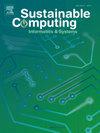基于混合GSCOA算法的绿色云计算多目标任务调度
IF 5.7
3区 计算机科学
Q1 COMPUTER SCIENCE, HARDWARE & ARCHITECTURE
引用次数: 0
摘要
随着近年来数据中心的扩张,与能源相关的挑战变得更加严重。绿色云计算(GCC)是一种新的计算范式,旨在解决云数据中心的能源消耗问题。尽管海湾合作委员会取得了进展,但大型绿色云数据中心在降低碳排放和能源消耗方面继续面临重大障碍,特别是在任务调度领域。无效的任务分配可能导致服务器利用率不足和服务器过度工作,浪费能源。工作负载的波动使得难以有效地管理资源,这经常导致在高需求期间出现能量峰值。当前的调度技术往往不能充分满足这些动态需求,因为它们可能没有考虑到不断变化的工作负载模式。为此,本文引入了一种有效的混合灰沙猫群优化算法(GSCOA)来有效地调度GCDC中的任务。这种混合方法利用了Sand Cat Swarm Optimization Algorithm (SCSOA)的开发技能和Greylag Goose Optimization Algorithm (GGOA)的探索能力。这种组合可以通过最小化能耗来有效地将云用户需求安排到云服务器。它有助于云服务器系统排放更少的二氧化碳,从而营造更环保的氛围。在nasa - ipsc和HPC2N两个实际工作负载上的仿真结果表明,该方法通过降低能耗和提高系统整体性能,显著优于现有的调度方法。本文章由计算机程序翻译,如有差异,请以英文原文为准。
An efficient multi-objective task scheduling for Green cloud computing using hybrid GSCOA algorithm
With the expansion of data centres in recent years, energy-related challenges have become worse. Green cloud computing (GCC) is a new computing paradigm designed to address cloud data centre energy consumption. Even with the advancements in GCC, large-scale green cloud data centres (GCDCs) continue to confront significant obstacles in lowering carbon emissions and energy consumption, particularly in the area of task scheduling. Ineffective task distribution can result in underutilized servers and overworked servers, wasting energy. Workload fluctuations make it difficult to manage resources effectively, which frequently results in energy spikes during periods of high demand. These dynamic demands are frequently not adequately satisfied by the current scheduling techniques since they might not take into consideration changing workload patterns. Therefore, in this work, an effective hybrid Greylag Sand Cat Swarm Optimization Algorithm (GSCOA) is introduced to schedule the task effectively in GCDC. This hybrid approach makes use of the Sand Cat Swarm Optimization Algorithm's (SCSOA) exploitation skills and the Greylag Goose Optimization algorithm's (GGOA) exploring capabilities. This combination makes it possible to schedule cloud user requirements to the cloud server efficiently by minimizing energy consumption. It helps the cloud server system emit less carbon dioxide, allowing for a more environmentally friendly atmosphere. Simulation results on two real-world workloads-NASA-IPSC and HPC2N, indicate that the proposed approach significantly outperforms existing scheduling methods by reducing energy consumption and improving overall system performance.
求助全文
通过发布文献求助,成功后即可免费获取论文全文。
去求助
来源期刊

Sustainable Computing-Informatics & Systems
COMPUTER SCIENCE, HARDWARE & ARCHITECTUREC-COMPUTER SCIENCE, INFORMATION SYSTEMS
CiteScore
10.70
自引率
4.40%
发文量
142
期刊介绍:
Sustainable computing is a rapidly expanding research area spanning the fields of computer science and engineering, electrical engineering as well as other engineering disciplines. The aim of Sustainable Computing: Informatics and Systems (SUSCOM) is to publish the myriad research findings related to energy-aware and thermal-aware management of computing resource. Equally important is a spectrum of related research issues such as applications of computing that can have ecological and societal impacts. SUSCOM publishes original and timely research papers and survey articles in current areas of power, energy, temperature, and environment related research areas of current importance to readers. SUSCOM has an editorial board comprising prominent researchers from around the world and selects competitively evaluated peer-reviewed papers.
 求助内容:
求助内容: 应助结果提醒方式:
应助结果提醒方式:


